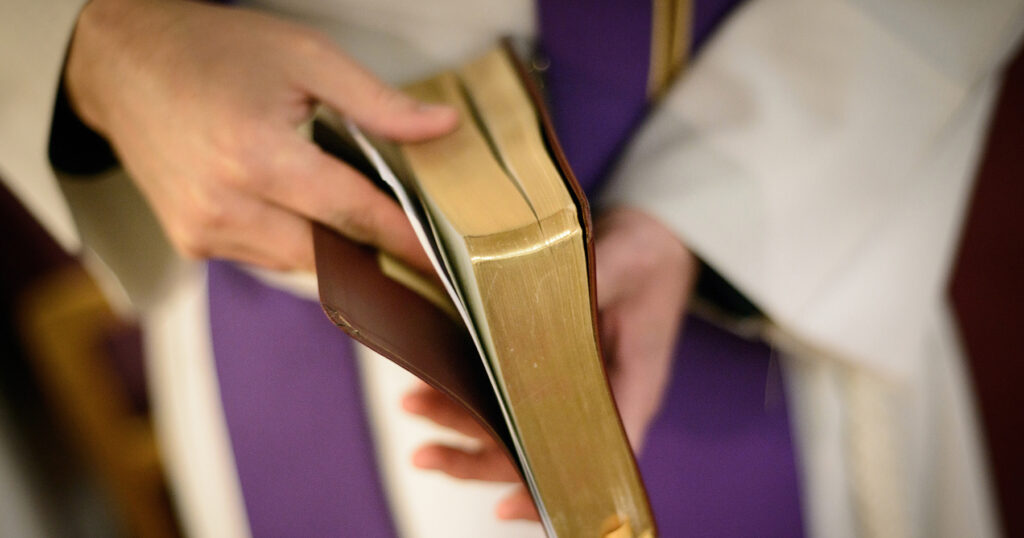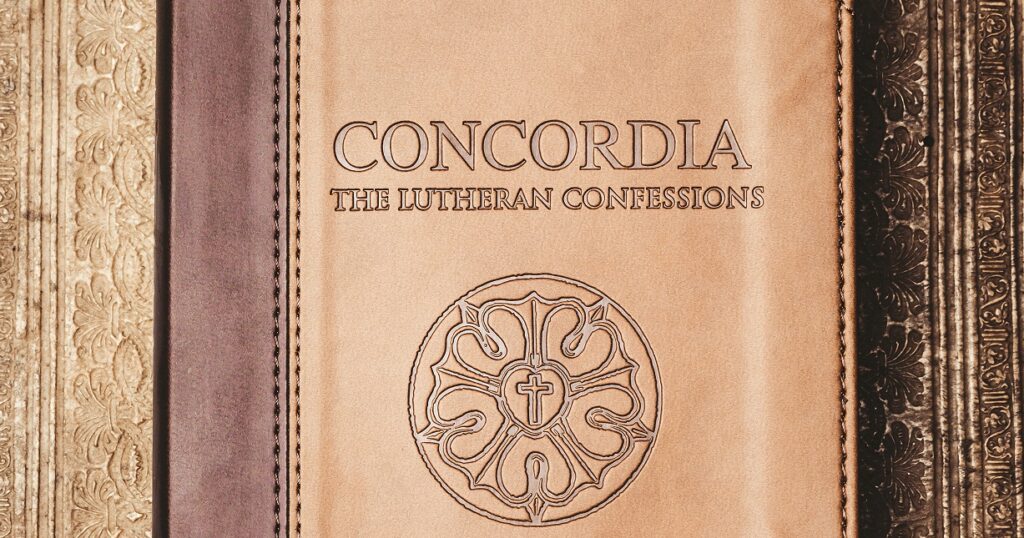by Matthew C. Harrison
Thousands of Christian denominations cover the globe, including “non-denoms,” which are themselves a kind of denomination. How can confessional Lutherans possibly claim that we have the correct teaching of Christ over against so many others? It’s not quite as complex as it seems. Only a couple of questions help us get to the heart of the matter. Think of it like a flowchart.
The first question is: “What is the highest authority in the church?” If the answer is church, council or pope, then one has the choice between the Roman Catholic Church or Eastern Orthodoxy. If the answer is that Scripture is higher than popes or councils, it’s a choice between so-called Protestant churches.
Rome places councils and popes above Scripture as seen in the promulgation of doctrines about Mary in 1854 and 1950. The first states, “The most Blessed Virgin Mary, from the first moment of her conception, by a singular grace and privilege from Almighty God and in view of the merits of Jesus Christ, was kept free of every stain of original sin.” The second, in 1950, states, “Mary, Immaculate Mother of God ever Virgin, after finishing the course of her life on earth, was taken up in body and soul to heavenly glory.” Both of these originated in the ancient eastern church but were never officially made doctrine. Rome asserts that there are “traditions” outside of Holy Scripture that must, if confirmed by the pope and church, be believed by all faithful Christians. There’s only one problem: The Holy Scriptures say not a whisper about these teachings.
Our response is that no matter how significant and meaningful these traditions are to you, you cannot charge the church to believe anything that is not found in the prophetic and apostolic Scriptures. Scripture alone determines doctrine. Lutherans have a positive view of tradition. Luther’s was a conservative reformation. The Lutherans retained and purified traditions and practices that did not contradict the Gospel of free forgiveness in Christ’s cross and resurrection. But tradition must always be subservient to and normed by Scripture alone. Just note the way Jesus rejected traditions not supported by the Bible: “In vain do they worship me, teaching as doctrines the commandments of men” (Matt. 15:9).
The second question in the flowchart is, “What role do works play in salvation?” Today, the question is often asked this way: “Does Scripture teach that you must make a decision to be saved?” If yes, go to the churches that teach decision theology. If no, go to the churches that teach that salvation is by God’s complete work alone.
The Gospel is exceedingly clear. Augsburg Confession IV lays it out, based upon Romans 3–4: “Our churches teach that people cannot be justified before God by their own strength, merits, or works. People are freely justified for Christ’s sake, through faith, when they believe that they are received into favor and that their sins are forgiven for Christ’s sake. By His death, Christ made satisfaction for our sins. God counts this faith for righteousness in His sight.”
This confession draws a line over against any teaching or tradition that would turn the Gospel into Law (our doing, our decision, our action) and condemns such teachings.
A third question then arises: “How does what happened on the cross 2,000 years ago and thousands of miles away (from the central U.S.) get to us here and now?” If the forgiveness Jesus won on the cross is delivered to you in some abstract, imperceptible or internal way, go to the churches without Sacraments. If Jesus delivers His forgiveness in real, perceptible, tangible ways — water, word, bread and wine — go to a church with these Means of Grace.
The Lutheran Church is nothing new. It is as old as the word of the apostles and prophets. It is the church that believes Scripture is the sole rule and norm of faith and practice. It is the church that believes salvation is 100% God’s work, that no contribution of man, however small, is required. And it is the church that believes God delivers His gifts in physical means, in Sacraments.
We could add other questions to the flowchart:
- Is the Word of God mere information upon which I am to make a decision? Or is God’s Word “living and active, sharper than any two-edged sword, piercing to the division of soul and of spirit, of joints and of marrow” (Heb. 4:12)? Is it “the power of God for salvation” (Rom. 1:16)?
- Does the word of the Law actually condemn “that every mouth may be stopped, and the whole world may be held accountable to God” (Rom. 3:19), or does it only give the way to live a God-pleasing life? It’s not the Gospel if salvation is finally up to me. “Jesus has done all He could; now it’s up to you,” I used to tell people when I was heavily influenced by evangelicalism as a young man. But God says, “You were dead in the trespasses and sins in which you once walked, … but God … made us alive” (Eph. 2:1–2, 4–5).
- Is Baptism a symbol of grace, or worse, something I do to show I’m serious about God? Or does it actually bestow the forgiveness of sins as the New Testament repeatedly teaches? Does it bring the treasures of Christ’s death and resurrection to me as God’s own act? “He saved us, not because of works done by us in righteousness, but according to his own mercy, by the washing of regeneration and renewal of the Holy Spirit” (Titus 3:5). Paul says repeatedly that in Baptism we are connected to Christ and receive His benefits.
- Is the Lord’s Supper a symbol of the body and blood of Christ, which are far away in heaven, or is what Christ says true? “This is my body … this is my blood of the covenant, which is poured out for many for the forgiveness of sins” (Matt. 26:26, 28).
If I believe salvation is something worked by a secret voice of God, quite apart from His Word, if the Sacraments are symbols of salvation, then I belong in one of the many Reformed churches, which include many of the “non-denominational” churches.
Confessional Lutherans have never denied one can be saved outside the Lutheran church. A pure confession doesn’t save; Jesus saves. Faith clings to Him. The point of being Lutheran is not to be proud of one’s confession, but to be confident of one’s salvation, purely for the sake of Jesus.
It’s not easy to be confessional Lutherans who have the highest regard for the inerrant Scriptures and the summary of Scripture in the blessed catechism, and to hold to them over against many false teachings about Jesus and His Gospel. But it’s never been different. We hold to the right teaching of the Gospel and all its articles because therein we have absolute certainty that we are God’s children by His grace alone. We will not compromise or give up anything of the Six Chief Parts (Ten Commandments, Creed, Lord’s Prayer, Baptism, Keys, Supper). These are very clearly taught by Jesus in the Gospels and bolstered by the rest of the New Testament. But we also rejoice greatly when we see, hear and know sincere people who love Jesus and believe in His forgiveness, even if they get some things wrong.
—Pastor Harrison




